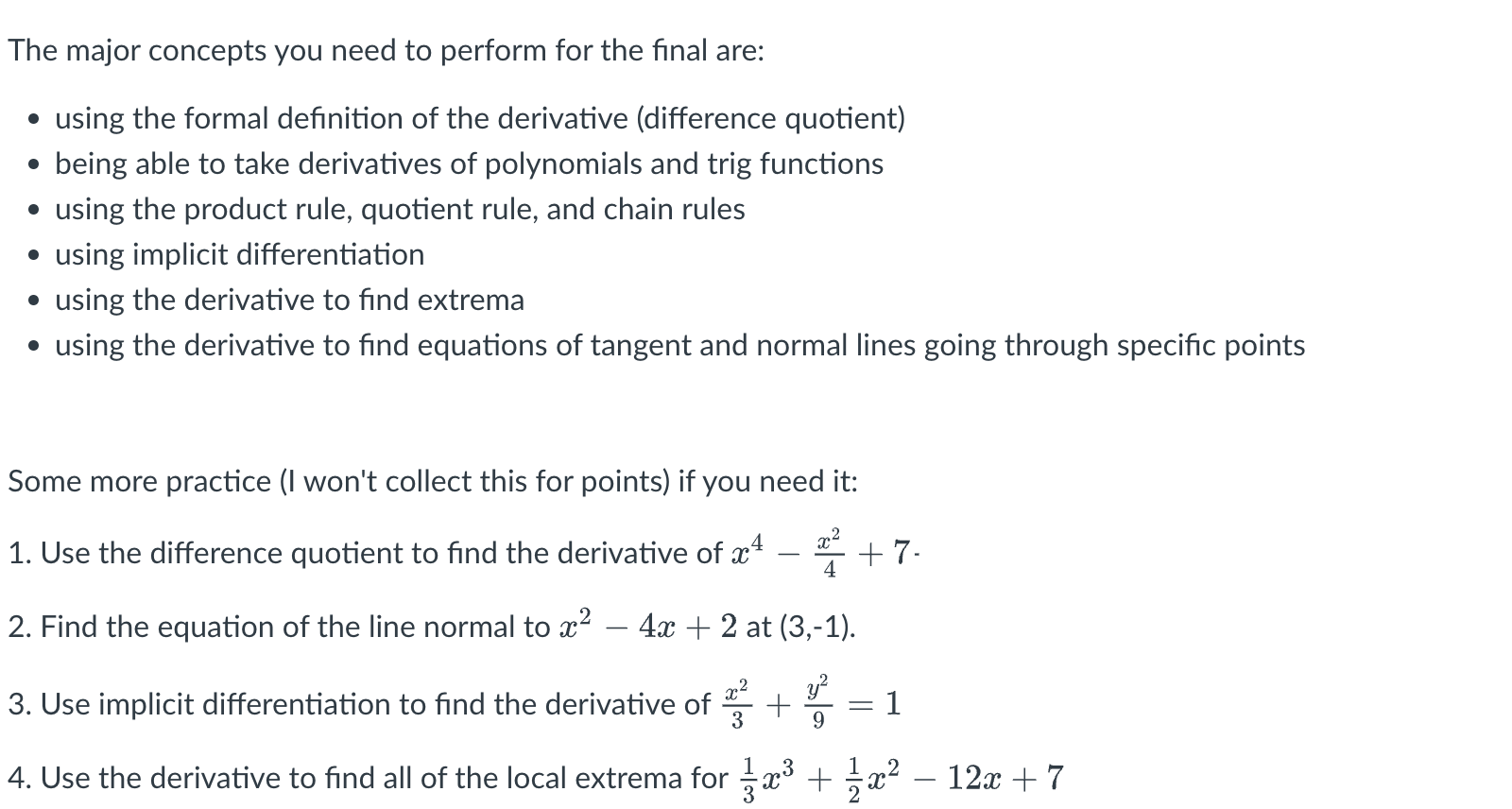1. Use the difference quotient to find the derivative of x^4 - x^2/4 + 7. 2. Find the equation of the line normal to x^2 - 4x + 2 at (3, -1). 3. Use implicit differentiation to fin... 1. Use the difference quotient to find the derivative of x^4 - x^2/4 + 7. 2. Find the equation of the line normal to x^2 - 4x + 2 at (3, -1). 3. Use implicit differentiation to find the derivative of x^2/3 + y^2/9 = 1. 4. Use the derivative to find all of the local extrema for 1/3 x^3 + 1/2 x^2 - 12x + 7.

Understand the Problem
The question outlines major concepts related to derivatives in calculus and provides practice problems that need solving using those concepts. This includes using the formal definition of the derivative, implicit differentiation, and finding local extrema.
Answer
1. \( f'(x) = 4x^3 - \frac{1}{2}x \) 2. \( y + 1 = -\frac{1}{106.5}(x - 3) \) 3. \( \frac{dy}{dx} = -\frac{3x}{y} \) 4. Local extrema at \( x = 3 \), \( x = -4 \)
Answer for screen readers
- Derivative: ( f'(x) = 4x^3 - \frac{1}{2}x )
- Equation of the normal line: ( y + 1 = -\frac{1}{106.5}(x - 3) )
- Implicit derivative: ( \frac{dy}{dx} = -\frac{3x}{y} )
- Local extrema: ( x = 3 ) and ( x = -4 )
Steps to Solve
- Finding the Derivative using the Difference Quotient
To find the derivative of the function ( f(x) = x^4 - \frac{x^2}{4} + 7 ) using the difference quotient, we apply the formula: $$ f'(x) = \lim_{h \to 0} \frac{f(x + h) - f(x)}{h} $$
Calculate ( f(x + h) ): $$ f(x + h) = (x + h)^4 - \frac{(x + h)^2}{4} + 7 $$
Expand ( (x + h)^4 ) and ( (x + h)^2 ):
- ( (x + h)^4 = x^4 + 4x^3h + 6x^2h^2 + 4xh^3 + h^4 )
- ( (x + h)^2 = x^2 + 2xh + h^2 )
Thus, $$ f(x + h) = x^4 + 4x^3h + 6x^2h^2 + 4xh^3 + h^4 - \frac{x^2 + 2xh + h^2}{4} + 7 $$
Now, combine and simplify: $$ f(x + h) = x^4 - \frac{x^2}{4} + 7 + (4x^3 - \frac{1}{2}x)h + \left(6x^2 - \frac{1}{4}\right)h^2 + O(h^3) $$
Now compute ( f(x + h) - f(x) ): $$ f(x + h) - f(x) = (4x^3 - \frac{1}{2}x)h + \left(6x^2 - \frac{1}{4}\right)h^2 + O(h^3) $$
- Simplifying the Expression
Dividing by ( h ) gives: $$ \frac{f(x + h) - f(x)}{h} = 4x^3 - \frac{1}{2}x + \left(6x^2 - \frac{1}{4}\right)h + O(h^2) $$
Taking the limit as ( h \to 0 ): $$ f'(x) = 4x^3 - \frac{1}{2}x $$
- Finding the Normal Line
The slope of the tangent line at the point ( (3, -1) ) is given by: $$ f'(3) = 4(3)^3 - \frac{1}{2}(3) = 108 - \frac{3}{2} = 106.5 $$
The slope of the normal line is the negative reciprocal: $$ m = -\frac{1}{106.5} $$
Using the point-slope form of the line: $$ y - (-1) = -\frac{1}{106.5}(x - 3) $$
- Using Implicit Differentiation
Differentiate both sides of ( \frac{x^2}{3} + \frac{y^2}{9} = 1 ): $$ \frac{2x}{3} + \frac{2y}{9}\frac{dy}{dx} = 0 $$
Rearranging gives: $$ \frac{dy}{dx} = -\frac{2x}{3} \cdot \frac{9}{2y} = -\frac{3x}{y} $$
- Finding Local Extrema
To find local extrema for ( g(x) = \frac{1}{3}x^3 + \frac{1}{2}x^2 - 12x + 7 ), calculate the derivative: $$ g'(x) = x^2 + x - 12 $$
Set the derivative to zero and solve: $$ x^2 + x - 12 = 0 $$
Using the quadratic formula: $$ x = \frac{-b \pm \sqrt{b^2 - 4ac}}{2a} = \frac{-1 \pm \sqrt{1 + 48}}{2} = \frac{-1 \pm 7}{2} $$
The solutions are: $$ x = 3 \quad \text{and} \quad x = -4 $$
Finding the corresponding ( y )-values gives local extrema.
- Derivative: ( f'(x) = 4x^3 - \frac{1}{2}x )
- Equation of the normal line: ( y + 1 = -\frac{1}{106.5}(x - 3) )
- Implicit derivative: ( \frac{dy}{dx} = -\frac{3x}{y} )
- Local extrema: ( x = 3 ) and ( x = -4 )
More Information
The calculation of derivatives using the difference quotient provides a foundational understanding of rates of change. Finding the normal line emphasizes the relationship between tangent and normal slopes.
Tips
- Not simplifying expressions properly: Always expand and combine like terms to avoid errors.
- Forgetting the negative reciprocal for normal lines: Ensure that the normal line's slope is the negative reciprocal of the tangent's slope.
- Misapplying implicit differentiation: Remember to use the chain rule when differentiating ( y ).
AI-generated content may contain errors. Please verify critical information